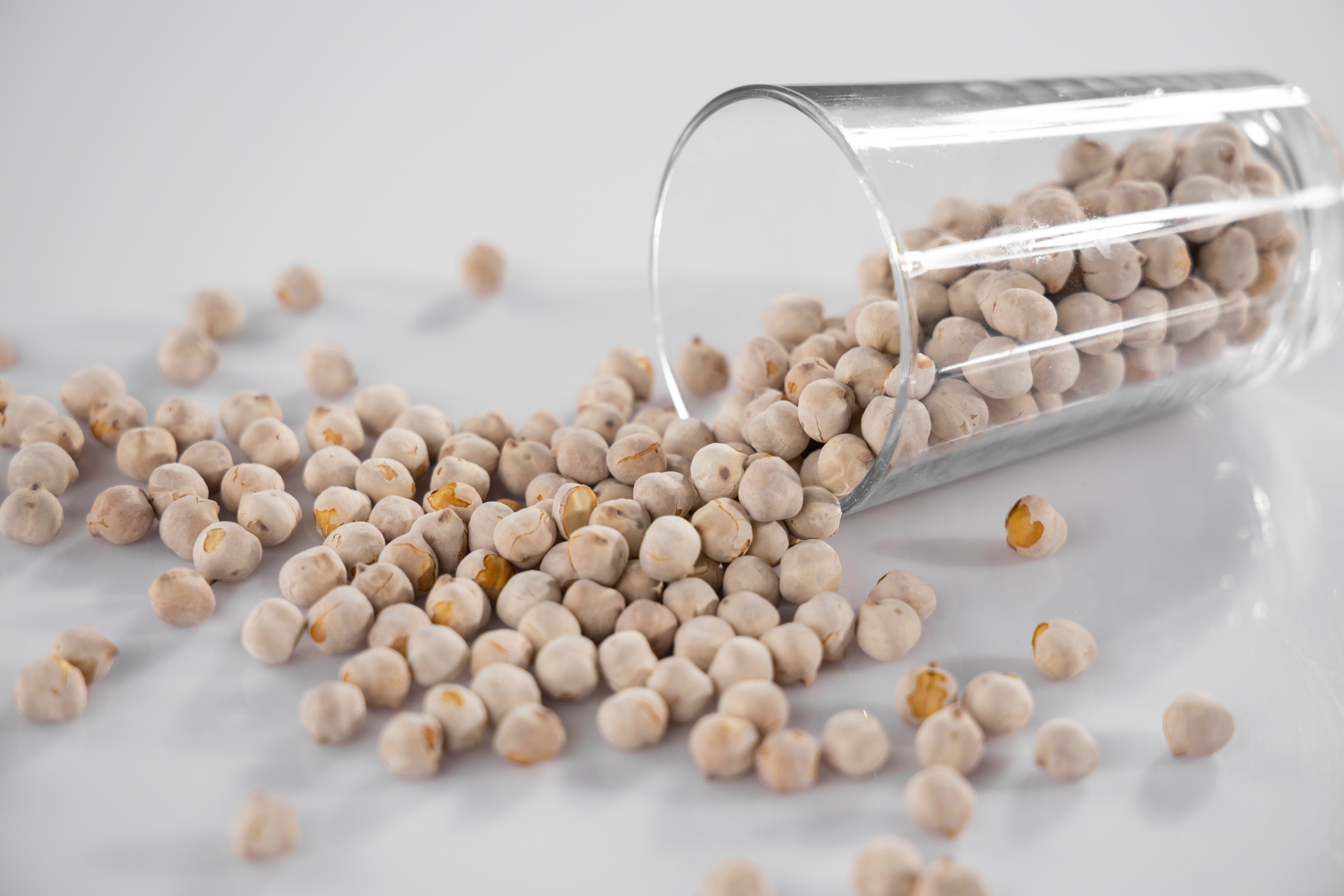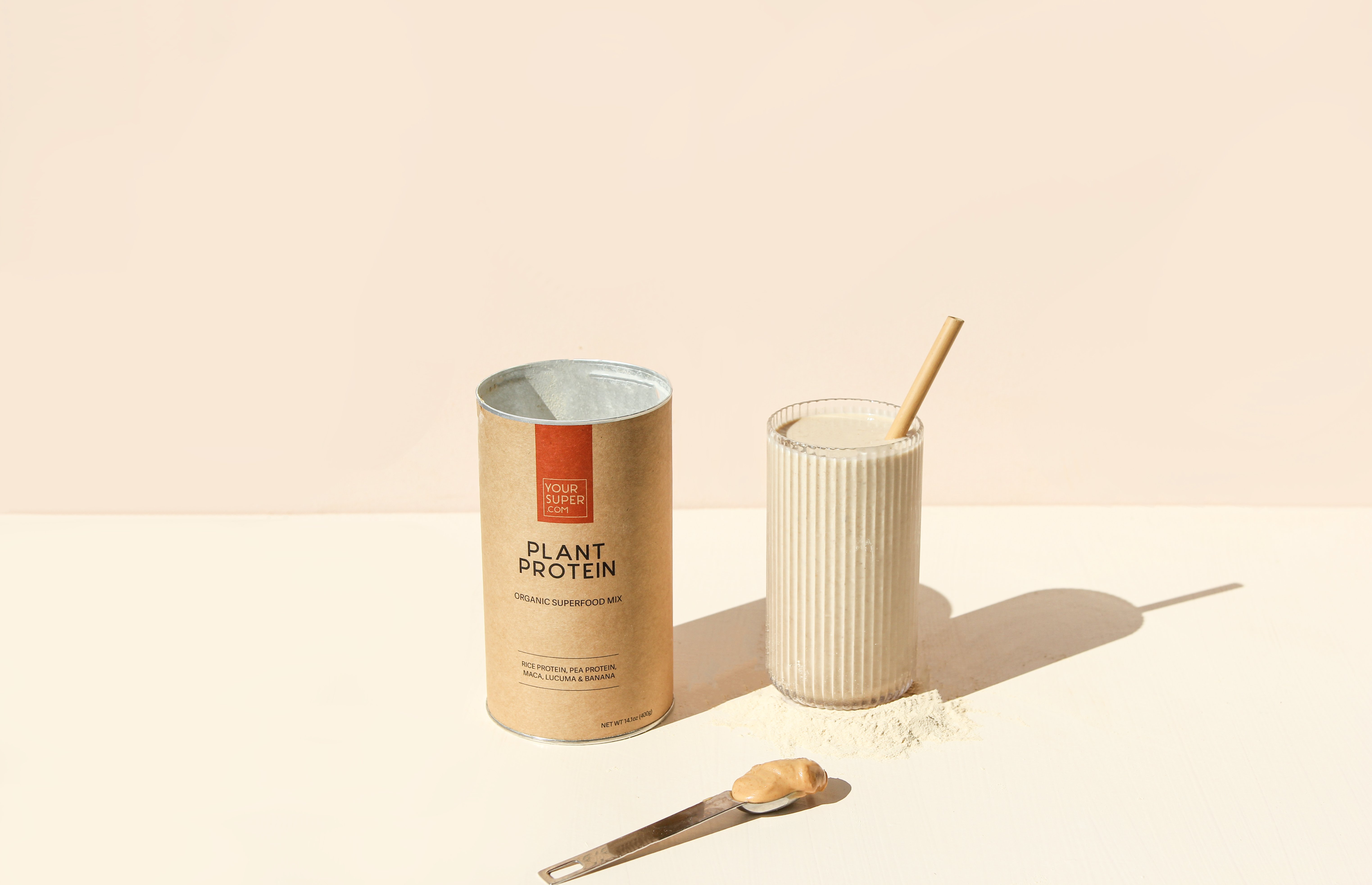If you eat a plant-based diet, there’s one question you get asked over and over: “Where do you get your protein?!”
The world is obsessed with meat! And many people believe the only way to get protein is from eating steak, bacon and chicken. But the truth is, you can get all the protein you need on a plant-based diet. A 2013 study compared the protein intake of 71,000 non-vegetarians, vegetarians and vegans (1). The study found that vegetarians and vegans got 70% more protein than they need, while non-vegetarians got 80% more than they need.
So why would someone choose plant protein over animal protein? And if you do only get your protein from plants, what are the best plant-based protein sources?
What is protein?
Protein is an essential macronutrient, meaning that your body needs a good amount of it to function properly. Your body uses protein to build enzymes, hormones, and tissues found in your muscles, bones, skin, and hair. In fact, it makes up about 15% of your body weight!
Protein is made up of amino acids, the building blocks of protein. Amino acids are organic compounds used by the body to help transport nutrients, prevent illness and carry out many other body functions. While a healthy body stores 11 non-essential amino acids, your body still needs nine essential amino acids that come only from food (2).
Luckily, there are plenty of foods that contain protein. But what many don’t know is that some protein sources are doing more harm than good.

Animal protein vs plant-based protein: what's the difference?
When you think of protein, what’s the first thing that comes to your mind? If I had to take a guess, it’s probably not tofu or quinoa. The truth is, meat is still the star of the dinner plate, but when it comes to getting your protein, it may not be the healthiest option.
Red meat is often recommended as a healthy protein option, but studies have linked red meat consumption to an increased risk of cancer (3) and stroke in both men and women (4). In addition, diets rich in processed meats like cold cuts, hot dogs and bacon have been known to cause cardiovascular disease, cancer and in severe cases – death. In fact, the World Health Organization classifies processed meats as carcinogenic to humans.
When it comes to getting the protein your body needs, eating meat isn’t only an unhealthy option, it’s a risky one. But here’s some good news... plants contain protein! In fact, that’s how animals like cows and pigs get their protein: by eating plants that come out of the ground!
Plant-based foods including beans, grains and nuts are chock-full of essential nutrients and protein. And compared to meat, these foods can actually keep you living a healthier, longer life.
In a 2018 study published in the “International Journal of Epidemiology,” researchers closely assessed the diets of 81,337 participants for five years (5). After following up years later, they found that the risk of cardiovascular deaths steadily climbed with higher consumption of meat protein, but remained low with increased consumption of protein from nuts and seeds.
And in 2003, a study published in “The American Journal of Clinical Nutrition” confirmed that diets lower in meat consumption led to a longer life expectancy (6).
So, it sounds like Popeye was really onto something when he said “I’m strong to the finish ‘cause I eats me spinach.”

Top 7 plant-based protein sources
If getting strong like Popeye was one of your 2020 resolutions, take some advice from Germany’s Strongest Man and former bodybuilder, Patrik Baboumian – and go plant-based! He gained major popularity after the release of the documentary “Game Changers,” which documented famous plant-based athletes.
"Why do I not eat meat? Vegetables give me all the nutrients I need to be a high performance athlete, including proteins.” Get the protein your body needs from these plant-based foods!
1. Tempeh
Tempeh, a fermented soy product, boasts 15 grams of protein for every 3-ounce serving. This hearty meat alternative has a firm, chewy texture and somewhat nutty flavour. Tempeh can be baked, sautéed or steamed. (We suggest buying organic tempeh to avoid GMOs.)
2. Tofu
Tofu is a popular meat substitute made from condensed soy milk. It’s pressed into white blocks which vary in softness, making it a versatile vegetarian option. Just one 3.5 ounce serving contains 8 grams of protein and 20% of the daily recommended amount of calcium. (We suggest buying organic tofu to avoid GMOs.)
3. Beans / legumes
Beans and legumes are fibre-rich powerhouses and excellent sources of protein. This wide range of versatile foods can provide almost half the DV for protein per cup. The beans and legumes with the highest amount of protein are soybeans, lentils and white beans.
4. Nuts and seeds
Nuts and seeds are nutrient-rich superfoods in tiny packages! Just a handful of nuts can contain 3 to 7 grams of protein and 1 to 3 grams of fibre.
5. Quinoa
Quinoa is an ancient crop that was praised by the Inca Empire as “mother of all grains.” This pseudocereal is not only recognized as a complete protein source, it’s also a great source of omega-6 and vitamin E. One cup of cooked quinoa contains 8g of protein and 5g of fiber.
6. Hemp protein
Hemp protein is one of the more popular protein powders because it contains high-quality protein and essential amino acids. It’s made by grinding pressed hemp seeds into a fine powder. Not only is hemp an excellent source of plant-based protein, but it’s packed with micronutrients such as vitamin E, fibre, potassium, calcium and iron. You can find hemp protein in our Skinny Protein mix!
7. Pea protein
Pea protein powder is a high quality protein made from ground yellow peas. It is commonly used to speed up muscle recovery and build muscle mass. Like hemp, this plant-based protein contains nine essential amino acids (7). Pea protein is also high in iron and easy to digest. You can find pea protein in both our Plant Protein mix and Skinny Protein mix. Easily add it to your smoothies, oatmeal, or favorite plant-based milk!

How much protein do you really need?
By now, you’ve probably heard of weight loss fads that tout the benefits of high-protein, low-carb diets. But what these diet trends don’t take into consideration is the way they can affect your health. And when it comes to protein, it is possible to have too much of a good thing.
Several studies show that consuming high amounts of protein may cause adverse health effects, some of which include (8): increased risk of bone loss, colon cancer and coronary artery disease. Researchers believe this is because extra protein isn’t used efficiently, which causes a metabolic burden in other areas of your body.
Whether you’re a beefy bodybuilder, a lean yogi, or somewhere in-between, it’s important to know how much protein your body actually needs. And if you live in a developed country and eat a normal amount of whole foods, it’s highly unlikely you’re protein deficient.
So how much protein do you need? Probably less than you think. The National Academy of Medicine recommends that the average adult gets at least 0.8 grams of protein for every kilogram of body weight per day (9). But researchers stress that it’s the source of your protein that matters most in terms of your health.
Power your body with plants!
Protein is a key part of any diet. But you probably need less than you think. And when it comes to the source of your protein, it’s important to consider the health effects that may come with it.
Because protein is found in a majority of plant-based foods, it’s easy to make the healthy choice. So the next time a friend asks “where do you get your protein?!” just make them these recipes:
Plant protein meet superfoods
With Plant Protein and Skinny Protein, pack up energy and nutrition in the same go!
Plant Protein is a plant-based protein powder containing 5 powerful superfoods to keep you full longer and provide clean, natural sources of energy.
Skinny Protein is a lean, green, carb-conscious plant-based protein mix that combines hemp and pea protein for all essential amino acids.
Whether you want to boost your workout session or feel more energised, these mixes will be just the right match for you.
Sources:
(1) https://www.ncbi.nlm.nih.gov/pmc/articles/PMC4081456/
(2) https://www.hsph.harvard.edu/nutritionsource/what-should-you-eat/protein/
(3) https://www.ncbi.nlm.nih.gov/pubmed/23467465
(4) https://www.ncbi.nlm.nih.gov/pubmed/22207512
(5) https://www.ncbi.nlm.nih.gov/pubmed/29618018
(6) https://academic.oup.com/ajcn/article/78/3/526S/4689992
(7) https://www.canr.msu.edu/news/pea-protein-isolate
(8) https://www.ncbi.nlm.nih.gov/pmc/articles/PMC4045293/
(9) https://www.hsph.harvard.edu/nutritionsource/what-should-you-eat/protein/



